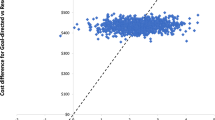ABSTRACT
BACKGROUND
Previous efforts to use incentives for weight loss have resulted in substantial weight regain after 16 weeks.
OBJECTIVE
To evaluate a longer term weight loss intervention using financial incentives.
DESIGN
A 32-week, three-arm randomized controlled trial of financial incentives for weight loss consisting of a 24-week weight loss phase during which all participants were given a weight loss goal of 1 pound per week, followed by an 8-week maintenance phase.
PARTICIPANTS
Veterans who were patients at the Philadelphia Veterans Affairs Medical Center with BMIs of 30–40.
INTERVENTION
Participants were randomly assigned to participate in either a weight-monitoring program involving a consultation with a dietician and monthly weigh-ins (control condition), or the same program with one of two financial incentive plans. Both incentive arms used deposit contracts (DC) in which participants put their own money at risk (matched 1:1), which they lost if they failed to lose weight. In one incentive arm participants were told that the period after 24 weeks was for weight-loss maintenance; in the other, no such distinction was made.
MAIN MEASURE
Weight loss after 32 weeks.
KEY RESULTS
Results were analyzed using intention-to-treat. There was no difference in weight loss between the incentive arms (P = 0.80). Incentive participants lost more weight than control participants [mean DC = 8.70 pounds, mean control = 1.17, P = 0.04, 95% CI of the difference in means (0.56, 14.50)]. Follow-up data 36 weeks after the 32-week intervention had ended indicated weight regain; the net weight loss between the incentive and control groups was no longer significant (mean DC = 1.2 pounds, 95% CI, -2.58–5.00; mean control = 0.27, 95% CI, -3.77–4.30, P = 0.76).
CONCLUSIONS
Financial incentives produced significant weight loss over an 8-month intervention; however, participants regained weight post-intervention.



Similar content being viewed by others
REFERENCES
Ogden C, Carroll M, Curtin L, McDowell M, Tabak C, Flegal K. Prevalence of overweight and obesity in the United States. J Am Med Assoc. 2006;393(15):1549–55.
Jeffery RW, Thompson PD, Wing RR. Effects on weight reduction of strong monetary contracts for calorie restriction or weight loss. Behav Res Ther. 1978;16(5):363–9.
Jeffery R, Drewnowski A, Epstein L. Long-term maintenance of weight loss. Health Psychol. 2000;19(1 Suppl):5–16.
NIH. (United States Department of Health and Human Services). NIH Guide: Findings of Scientific Misconduct. 2001 December 13, 2001.
Heshka S, Anderson J, Atkinson R, et al. Weight loss with self-help compared with a structured commercial program: a randomized trial. J Am Med Assoc. 2003;2003(289):14.
Loewenstein G, Brennan T, Volpp KG. Asymmetric paternalism to improve health behaviors. J Am Med Assoc. 2007;298(20):2415–7.
Volpp K, John L, Troxel AB, Norton L, Fassbender J, Loewenstein G. Financial incentive-based approaches for weight loss: a randomized trial. J Am Med Assoc. 2008;300(22):2631–7.
Kahneman D, Tversky A. Prospect theory: an analysis of decision making under risk. Econometrica. 1979;47:263–91.
Ryan D, Espeland M, Foster G, et al. Look AHEAD (Action for Health in Diabetes): design and methods for a clinical trial of weight loss for the prevention of cardiovascular disease in type 2 diabetes. Control Clin Trials. 2003;24(5):610–28.
Ariely D, Wertenbroch K. Procrastination, deadlines, and performance: self-control by precommitment. Psychol Sci. 2002;13(3):219–24.
Knowler WC, Barrett-Connor E, Fowler SE, et al. Reduction in the incidence of type 2 diabetes with lifestyle intervention or metformin. N Engl J Med. 2002;346(6):393–403.
Svenson O, Fischhoff B, MacGregor D. Perceived driving safety and seatbelt usage. Accident Analysis & Prevention. 1985;17(2):119-133.
Weinstein ND. Unrealistic optimism about susceptibility to health problems: Conclusions from a community-wide sample Journal of Behavioral Medicine. 1987;10(5):1573-3521.
Tversky A, Kahneman D. Loss aversion in riskless choice: a reference-dependent model. Q J Econ. 1991;106(4):1039–61.
Ainslie G. Specious reward: a behavioral theory of impulsiveness and impulse control. Psychol Bull. 1975;82:463–96.
Thaler RH. Some empirical evidence on time inconsistency. Rev Econ Stud. 1981;23:165–80.
Loewenstein G, Prelec D. Anomalies in intertemporal choice: evidence and an interpretation. Q J Econ. 1992;107:573–97.
Kirby K. Bidding on the future: evidence against normative discounting of delayed rewards. J Exp Psychol Gen. 1997;126:54–70.
Griffin D, Buehler R. Frequency, probability, and prediction: easy solutions to cognitive illusions? Cogn Psychol. 1999;38:48–78.
Locke EA, Latham GP.A theory of goal setting and task performance Englewood Cliffs. NJ: Prentice Hall; 1990.
Contributors
Daniel McDonald
Funders
USDA, Economic Research Service (grant no. 58-4000-7-0058) and the Hewlett Foundation.
Prior Presentations
Annual Meeting of the Society for General Internal Medicine, Minneapolis, May, 2010.
Conflict of Interest
None disclosed.
Author information
Authors and Affiliations
Corresponding author
Rights and permissions
About this article
Cite this article
John, L.K., Loewenstein, G., Troxel, A.B. et al. Financial Incentives for Extended Weight Loss: A Randomized, Controlled Trial. J GEN INTERN MED 26, 621–626 (2011). https://doi.org/10.1007/s11606-010-1628-y
Received:
Revised:
Accepted:
Published:
Issue Date:
DOI: https://doi.org/10.1007/s11606-010-1628-y




